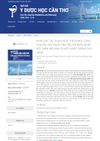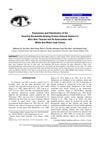 May 2023 in “Tạp chí Y Dược học Cần Thơ”
May 2023 in “Tạp chí Y Dược học Cần Thơ” The shampoo with grapefruit peel and Gleditsia sinensis helps mice grow hair faster, more, and longer.
 3 citations,
April 2018 in “Therapeutic Delivery”
3 citations,
April 2018 in “Therapeutic Delivery” Hair follicle regeneration and delivery is complex due to many molecular and cellular factors.
1 citations,
January 2021 in “European journal of medical and health sciences” PRP shows promise for treating hair loss, but more research is needed.
 1 citations,
November 2022 in “DOAJ (DOAJ: Directory of Open Access Journals)”
1 citations,
November 2022 in “DOAJ (DOAJ: Directory of Open Access Journals)” Male and female human hairs have different microscopic structures that can help in forensic analysis.
 27 citations,
February 2017 in “Biomedicine & Pharmacotherapy”
27 citations,
February 2017 in “Biomedicine & Pharmacotherapy” White wax and policosanol from white wax effectively reduced hair loss and promoted hair growth in mice better than a known hair growth drug.
 6 citations,
October 2017
6 citations,
October 2017 Indian Gooseberry has potential for cancer prevention and treatment and promotes hair growth.
 1 citations,
January 2017 in “Elsevier eBooks”
1 citations,
January 2017 in “Elsevier eBooks” The document concludes that new treatments for hair loss may involve a combination of cosmetics, clinical methods, and genetic approaches.
 2 citations,
April 2017 in “Molecular Medicine Reports”
2 citations,
April 2017 in “Molecular Medicine Reports” Blocking autophagy increases survival of inner ear hair cells exposed to gentamicin.
 39 citations,
July 2016 in “Biomedicine & Pharmacotherapy”
39 citations,
July 2016 in “Biomedicine & Pharmacotherapy” Cedrol from Platycladus orientalis leaves may promote hair growth effectively, especially in female mice.
 August 2016 in “InTech eBooks”
August 2016 in “InTech eBooks” Esthetic surgery complications can include infections, nerve injury, and more; proper evaluation and technique help prevent them.
 October 2007 in “Humana Press eBooks”
October 2007 in “Humana Press eBooks” Saw palmetto can help with prostate issues and may promote hair growth.
 3 citations,
April 2014 in “Journal of Dietary Supplements”
3 citations,
April 2014 in “Journal of Dietary Supplements” CARI ONE helps start hair growth and makes hair follicles bigger and more numerous.
 January 2022 in “International journal of pharmaceutical sciences review and research”
January 2022 in “International journal of pharmaceutical sciences review and research” Herbal cosmetics are becoming more popular because they are safer, have fewer side effects, and offer health benefits.
 1 citations,
January 2016 in “Asian-Australasian journal of animal sciences”
1 citations,
January 2016 in “Asian-Australasian journal of animal sciences” The protein Gnαs is found more in black mice than white mice and may influence their coat color.
 5 citations,
December 2011 in “InTech eBooks”
5 citations,
December 2011 in “InTech eBooks” Eat antioxidant-rich foods, reduce fast food, and explore various treatments for vitiligo.
 9 citations,
March 2009 in “European Journal of Dermatology”
9 citations,
March 2009 in “European Journal of Dermatology” Schisandra nigra extract may help hair grow by stimulating cells and preventing hair follicle damage.
 2 citations,
July 2009 in “Pharmacognosy Research”
2 citations,
July 2009 in “Pharmacognosy Research” A herbal mix with chickpea, holy basil, and nut grass extracts grew rat hair well, similar to a common hair growth drug.
 July 2023 in “JAAD International”
July 2023 in “JAAD International” Two drugs, finasteride and minoxidil, are approved for hair loss treatment, but new therapies are being developed.
 7 citations,
October 2018 in “Dermatology practical & conceptual”
7 citations,
October 2018 in “Dermatology practical & conceptual” Topical oxygen therapy may improve treatments for hair loss, acne, and chronic skin diseases with minimal side effects.
9 citations,
November 2021 in “PubMed” FDA-approved low-level light/laser therapy devices can significantly increase hair density in people with pattern hair loss.
 October 2023 in “International journal of biology, pharmacy and allied sciences”
October 2023 in “International journal of biology, pharmacy and allied sciences” Personalized treatment plans combining natural and synthetic approaches are important for managing alopecia effectively.
 March 2023 in “Zdorov'â čolovìka”
March 2023 in “Zdorov'â čolovìka” Certain medications can reduce sexual desire and function, especially in women.
January 2023 in “Pharmaceutics” AA–TF#15 significantly promotes hair regrowth and could be an effective treatment for androgenic alopecia.
3 citations,
January 2023 in “Agronomy” KDML105 bran extract may help with hair growth and prevent hair loss.
October 2023 in “Applied sciences” Iris germanica rhizome-derived exosomes help protect skin cells from oxidative stress and aging.
 8 citations,
September 2017 in “Journal of Natural Medicines”
8 citations,
September 2017 in “Journal of Natural Medicines” Applying an extract from Perilla frutescens helps hair grow and fights the effects of hair loss hormones.
 17 citations,
March 2006 in “Journal of Cosmetic Dermatology”
17 citations,
March 2006 in “Journal of Cosmetic Dermatology” Hormonal changes during and after pregnancy can cause hair growth changes and hair loss, with treatments available for some conditions.
 25 citations,
July 2017 in “Archives of Dermatological Research”
25 citations,
July 2017 in “Archives of Dermatological Research” Herbal products might promote hair growth with fewer side effects, but more research is needed to confirm their safety and effectiveness.
 36 citations,
September 2019 in “Journal of Herbal Medicine”
36 citations,
September 2019 in “Journal of Herbal Medicine” Herbal nano-formulations show potential for effective skin delivery but need more research.

Chrysanthemum zawadskii extract may help treat hair loss by promoting hair growth and affecting growth factors.
























